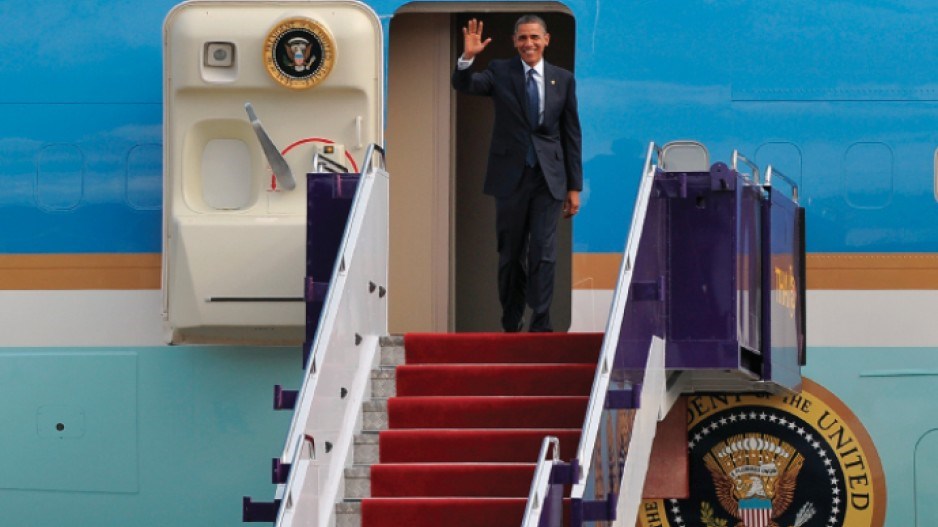One of the purposes of U.S. President Barack Obama’s four-nation Asian tour last week was to re-energize negotiations aimed at agreeing a minimum-tariff Trans-Pacific Partnership (TPP).
But with negotiators scheduled to gather in Vietnam for the next round of closed-door bargaining on May 12, Obama’s personal intervention does not appear to have removed any of the significant obstacles to a deal.
After talks with Japan’s Prime Minister, Shinzo Abe, on the first leg of Obama’s tour, officials tried to put a positive spin on the results. They talked about “significant achievements” and “defining a path forward.”
But when pressed, Japan’s economy minister, Akira Amari, conceded, “This time we can’t say there’s a basic agreement.”
The stalling points between Tokyo and Washington are Abe’s apparent determination to protect Japan’s politically influential farmers from the competition of imported agricultural products. The other major irritant is the myriad tariff and non-tariff barriers Japan erects to keep American cars off Japanese roads.
The results were no better when Obama went on to Malaysia, another TPP partner. Again, there were many smiles and officials pumping out as much positive spin as possible.
But there seems to have been no progress in calming Malaysia’s fears that the TPP agreement will expose Malaysia’s companies to dangerous degrees of foreign competition, especially on bids for government contracts, which are now licences to print money for the domestic concerns.
The TPP has grown out of a 2005 initiative by Singapore, New Zealand, Brunei and Chile to increase their economic integration. Since then eight other countries – Canada, the U.S., Mexico, Australia, Peru, Malaysia, Japan and Vietnam – have joined the talks. Beijing sees the TPP as part of Washington’s effort to contain China’s rise, but may come around if the partnership proves a success.
That now hangs on Obama’s failure so far to get the U.S. Congress to give him so-called “fast track” authority.
Without fast-track power the deal would require clause-by-clause approval by Congress, where there is much opposition to many elements. Understandably, none of the 11 other countries involved in the TPP negotiations are keen to sign up to a deal that may be substantially tinkered with by the U.S. Congress.
There is also broad objection to the basic thrust of the U.S. demands, which is to reinforce international trade regulations and control of intellectual property rights. In Washington this makes sense. More than 60% of the companies in the U.S. export sector are selling intellectual property of one sort or another, such as electronics, pharmaceuticals, defence manufacturing, aerospace and software. They bring in about $140 billion a year in royalties, about the same as agricultural exports.
Recent studies by a bipartisan congressional group, however, estimate that the money lost to intellectual property piracy in 2013 was equal to the total value of U.S. exports to Asia. And U.S. trade officials estimate American businesses lost 2.1 million jobs in 2011 due to intellectual property theft by China alone.
But most TPP partners are balking at the U.S. efforts to extend copyrights 75 years beyond the life of the holder, as opposed to 50 years now, and to extend patents for five years beyond the 20 years set out in current intellectual property rights agreements.
Conspiracy industry profits from secrecy over proposed trade deal
Even though agreement among 12 nations to conclude the wide-ranging free trade Trans-Pacific Partnership (TPP) still seems far off, the negotiations have already spawned a substantial industry.
The secrecy of the talks, which have been going on since 2005, punctuated by a few juicy leaks, has bred a host of conspiracy theories and campaigns of fear about civil rights that may be curtailed by the deal.
Last week an international consortium of advocacy groups, including the Council of Canadians and Vancouver-based OpenMedia.ca, launched a campaign with the catch-line “Stop the Secrecy.”
The campaign is aimed at U.S. President Barack Obama as he returned to Washington after a four-nation tour of Asia in which problems with the TPP negotiations loomed large.
Officials justify the Obama administration’s insistence on secrecy by saying the trade talks cannot be conducted in public because opponents would try to derail them. But the secrecy is selective.
The public, and even members of the U.S. Congress, are being refused information, but American corporations potentially affected by a successfully concluded TPP agreement are playing an active role as advisers to U.S. Trade Representative Michael Froman.
Even venerable institutions such as the editorial board of the New York Times have lined up with the conspiracy theorists.
The Times, like other objectors to the secrecy of the TPP talks, cited indications that companies privy to negotiations are working to dilute environmental standards, to bolster pharmaceutical patents that will deprive poor countries of important generic medicines, and to include corporate power to sue governments over policies they dislike.




